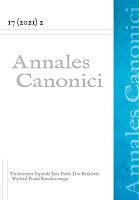Problem rozróżnienia pomiędzy wykluczeniem ipsum ius i wykluczeniem usus iuris w odniesieniu do bonum prolis w doktrynie i w orzecznictwie rotalnym
The problem of distinguishing between ipsum ius exclusion and the exclusion of usus iuris regard to bonum prolis in doctrine and jurisprudence
Author(s): Wojciech GóralskiSubject(s): Canon Law / Church Law
Published by: Wydawnictwo Naukowe Uniwersytetu Papieskiego Jana Pawła II w Krakowie
Keywords: marriage; offspring; offspring’s good; disfellowshipping; ius; usus iuris;
Summary/Abstract: In the area of canonical marital consent, one of the most „sensitive” issues is the issue of exclusion – by a positive act of will – bonum prolis, i.e. to bear children (it is an essential part of marriage). By entering into marriage, the parties undertake the mutual right-obligation to perform marital acts: uniting and open to procreation. Bearing in mind can. 1101 § 2 of the CIC, one can speak of the possibility of exclusion by the nupturient of bonum prolis. The author touches on a significant thematic thread concerning the subject of this exclusion resulting in the nullity of marriage. So he asks whether it is only the right to marital acts open to procreation (ipsum ius) or also the exercise of this right (usus iuris). Referring to the doctrine and jurisprudence of the Roman Rota, he shares the overwhelming view that only the exclusion of the right (ipsum ius) to matrimonial acts open to procreation invalidates the marriage, not the exclusion of usus iuris. Thus, it points to the validity of the distinction between the exclusion of ipsum ius and the exclusion of usus iuris.
Journal: Annales Canonici
- Issue Year: 18/2022
- Issue No: 1
- Page Range: 49-83
- Page Count: 35
- Language: Polish

